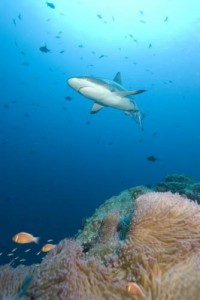New Shark Tourism Study May Have Implications For All Shark Infested Waters
By Sonia Isotov
According to a new study, shark tourism is worth $18 million annually to the Pacific Island nation of Palau. Additionally, a single reef shark can contribute almost $2 million in its lifetime to the economy of Palau.
The new study by the Australian Institute of Marine Science (AIMS) and the University of Western Australia quantified the economic benefits of the shark-diving industry to the Pacific island nation and found that its value far exceeded that of shark fishing. The possession, sale or distribution of shark fins in Paul has been banned since 2009.
“Sharks can literally be a ‘million-dollar’ species and a significant economic driver,” said Mark Meekan, principal research scientist at AIMS, in a written statement released today. “Because of their low rates of reproduction and late maturity, shark populations have been driven into a global decline due to fishing. Yet our study shows that these animals can contribute far more as a tourism resource than as a catch target.”
One shark expert told us that it is unknown how many sharks actually reside in Hawaii, let alone Maui.
“There are no valid statistics regarding the status of shark population in Hawaii,” said Dr. Kim Holland, a shark expert and researcher at the University of Hawai’i Institute of Marine Biology. “Sharks are significant ecologically, culturally and economically in Hawaii but I don’t think it is possible to put specific numbers on those factors.”
“What we can say for sure is that Hawaii is exceptional in that there is no present or previous commercial harvesting of sharks in Hawaii which means that our populations are much healthier than virtually any other tropical location. Skin diving tours certainly target areas where reef white tip sharks can be seen and the “shark tours” off Haleiwa have been successfully operating for several years. So, in this respect, our healthy shark populations play an important role in the visitor industry.” Dr. Kim Holland is also director of the university’s Hawaii Shark Lab on Coconut Island in Kaneohe Bay, Oahu.
“Shark tourism can be a viable economic engine,” said Matt Rand, director of Global Shark Conservation for the Pew Environment Group, a conservation arm of The Pew Charitable Trusts, which commissioned the research. “Overfishing of sharks can have disastrous effects on ocean ecosystems, but this study provides a compelling case that can convince more countries to embrace these animals for their benefit to the ocean and their value to a country’s financial well-being.”











